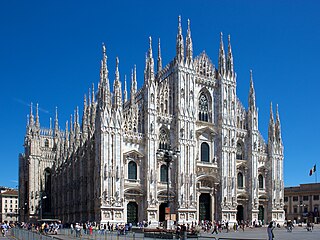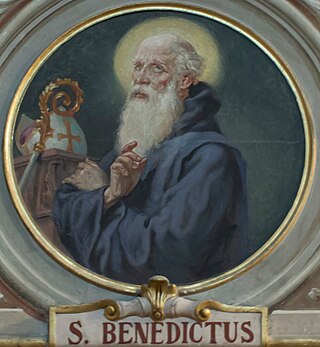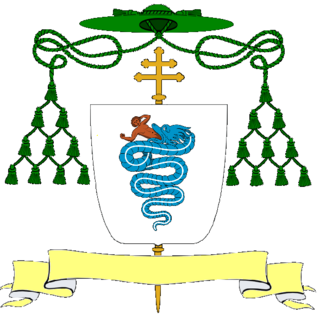Related Research Articles

The Investiture Controversy or Investiture Contest was a conflict between the Church and the state in medieval Europe over the ability to choose and install bishops (investiture) and abbots of monasteries and the pope himself. A series of popes in the 11th and 12th centuries undercut the power of the Holy Roman Emperor and other European monarchies, and the controversy led to nearly 50 years of conflict.

Capriate San Gervasio is a town and comune in the province of Bergamo, in Lombardy, northern Italy. As of 2019, its population was 8,216.

The Archdiocese of Milan is a Latin Church ecclesiastical territory or archdiocese of the Catholic Church in Italy which covers the areas of Milan, Monza, Lecco and Varese. It has long maintained its own Latin liturgical rite usage, the Ambrosian rite, which is still used in the greater part of the diocesan territory. Among its past archbishops, the better known are Ambrose, Charles Borromeo, Pope Pius XI and Pope Paul VI.

Anselm of Lucca, born Anselm of Baggio, was a medieval bishop of Lucca in Italy and a prominent figure in the Investiture Controversy amid the fighting in central Italy between Matilda, countess of Tuscany, and Emperor Henry IV. His uncle Anselm preceded him as bishop of Lucca before being elected to the papacy as Pope Alexander II and so he is sometimes distinguished as Anselm the Younger or Anselm II.

Saint Erlembald was the political and military leader of the movement known as the pataria in Milan, a movement to reform the clergy and the church in the Ambrosian diocese.

The pataria was an eleventh-century movement focused on the city of Milan in northern Italy, which aimed to reform the clergy and ecclesiastic government within the city and its ecclesiastical province, in support of papal sanctions against simony and clerical marriage. Those involved in the movement were called patarini, patarines or patarenes, a word chosen by their opponents, the etymology of which is unclear. The movement, associated with urban unrest in the city of Milan, is generally considered to have begun in 1057 and ended in 1075.

Simplician was Bishop of Milan from 397 to 400 or 401 AD. He is honoured as a Saint in the Roman Catholic and Eastern Orthodox Churches and his feast day is August 14.

The Synod of Worms was an ecclesiastical synod and imperial diet (Hoftag) convened by the German king and emperor-elect Henry IV on 24 January 1076, at Worms. It was intended to agree a condemnation of Pope Gregory VII, and Henry's success in achieving this outcome marked the beginning of the Investiture Controversy.

Benedict was Archbishop of Milan from c. 685–732. He is honoured as a saint in the Catholic and Eastern Orthodox Churches.
GotofredoI was the Archbishop of Milan from 974 until his death.

Eusebius was Archbishop of Milan from 449 to 462. He is honoured as a saint and his feast day is 12 August.

Senator of Milan or Senator of Settala was Bishop of Milan from 472 to 475. He is honoured as a saint in the Eastern Orthodox Church and Catholic Church and his feast day is 28 May.

Protasius was Archbishop of Milan. He is honored as a saint in the Catholic Church, with his feast day celebrated on 24 November, the day of his death.

Theodorus I was Archbishop of Milan from 475 to 490. He is honoured as a saint in the Eastern Orthodox Church and Catholic Church, and his feast day is July 27.
Lawrence I was Archbishop of Milan from 490 to c. 511. He is honoured as a saint in the Catholic Church and his feast day is July 25.

John the Good was Archbishop of Milan from c. 641 to 669. He is honoured as a Saint in the Catholic Church and his feast day is on January 2.

Mansuetus was Archbishop of Milan from 676 to 685. He is honoured as a saint in the Catholic Church.

Godfrey, known in Italian as Goffredo, Gotofredo or Gotifredo, was Patriarch of Aquileia in northern Italy from 1182 to 1194. He was a supporter of the Imperial party in its disputes with the Pope. He was involved in a war with the neighboring commune of Treviso, which was unresolved at his death.
Tedald was archbishop of Milan from 1075 to 1085.

Giovanni III Visconti was the Italian Catholic Archbishop of Milan.
References
- ↑ The Iron Crown and Imperial Europe: In search of the original artifact. Pt. 1. Art and Cult. G. Mondadori. 1999. p. 325. ISBN 978-88-374-1465-8.
- ↑ D'Alessandro, Vincenzo (1974). La crisi della democrazia comunale (in Italian). G. D'Anna. p. 13. ISBN 978-88-8321-505-6.